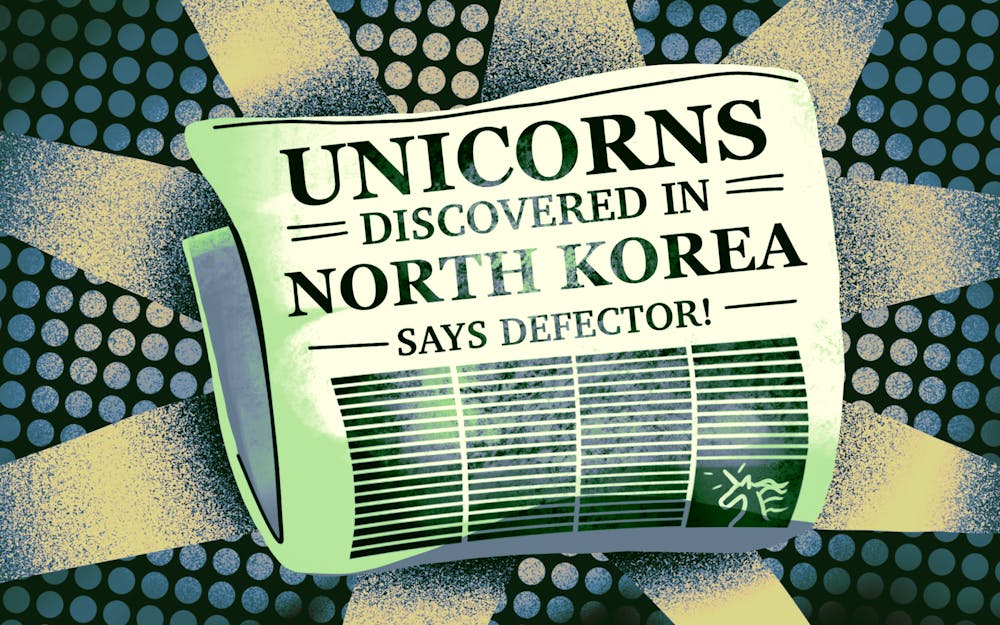Did you know that an official news agency in North Korea confirmed the existence of a unicorn lair in their country in 2012?
The western press widely reported that North Korean news agencies said this. Unicorns aren’t real, of course. Everyone knows that – including North Koreans, who never said any such thing. The reports in the western press were based on a mistranslation.
Frivolous and false stories about North Korea like this unicorn lair incident are all too common. In 2014, the dishrag that is the New York Post published a story titled, “North Korean men ordered to get Kim Jong Un’s haircut.” Three years later and seemingly without an ounce of shame, the same outlet published a story called, “North Korean men aren’t allowed to get Kim Jong Un’s haircut.”
And it isn’t just embarrassments like the Post who publish such nonsense: the “serious” journalists at the BBC also ran the haircut story. The serious journalists at The Guardian reported that North Korea had banned skinny jeans in an effort to combat “capitalistic lifestyles.” The Guardian wrote this story with confidence; meanwhile, fact checkers at Snopes said that reports of such a ban are unproven.
[Related: OPINION: Denouncing the horrors of capitalism]
You might say these stories are inconsequential, harmless even — that is, if one considers portraying a foreign country in the most absurd possible light to be harmless. So, the press got the unicorn story wrong, and the haircut story and the skinny jeans story. They get it right when it counts. Right?
Wrong! As an example, consider when in 2020 several outlets reported that North Korean leader Kim Jong Un was in critical condition, or possibly even dead, after having heart surgery. He did not die, of course, and there’s no evidence to suggest he was close to dying.
The press has also falsely claimed numerous times that notable North Koreans had been executed only for these dead people to appear later on television. In 2014, it was reported that a singer – apparently the ex-girlfriend of Kim – had been executed. A year later she was seen on live television praising Kim’s leadership.
Other fake purges and executions include a story from 2016 about a North Korean General reported by South Korean intelligence to have been executed only to later appear alive, and a 2019 story about a diplomat who had apparently been sent to a labor camp only to be seen not in a labor camp days later.
To read the western reports, it would seem that not only have North Koreans discovered unicorns, they have also mastered death!
All of this raises the question: why does the press get North Korea wrong so often?
CNN, in their coverage of Kim’s apparent health problems in 2020, offered this excuse:
“Gathering intelligence out of North Korea is notoriously difficult – one of the most challenging targets for U.S. intelligence. North Korea tightly controls any information surrounding its leader...”
So, that’s it. It’s hard. I guess it’s okay if your reporting sucks if the job is hard! What a relief for all of us journalism students!
In seriousness, it’s worth asking – if you have any integrity – why you would report something if you weren’t absolutely certain of its veracity. As a member of the press, isn’t it your job to “seek the truth and report it?”
[Related: OPINION: 6 books every leftist should read (and a few others)]
Speaking on the prevalence of disinformation about North Korea in the press, one BBC commentator suggested that these stories were so numerous because they are a “great way to get clicks.”
It really all does come back to capitalism and its need to accumulate more and more profit, doesn’t it? But this only explains why bad journalism gets published. We should also be asking why bad journalism is made in the first place.
One major problem is sourcing. Click any of the links on this column, and you’ll see a common theme: journalists getting information from anonymous sources, U.S. and South Korean government officials, defectors (who have been known to lie) and propaganda outlets like Radio Free Asia. Not exactly reliable sources of information.
Most people probably just sit back and laugh at the silly lies the press prints about North Korea. And sure, some of them are funny. But the press needs to look in the mirror and stop wondering why fewer and fewer people continue to trust them. When you’re wrong this often – why should anyone trust you?
Jared Quigg (he/him) is a junior studying journalism and political science.




